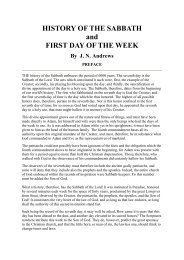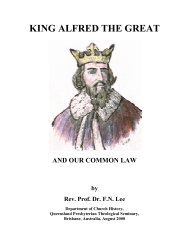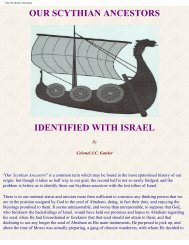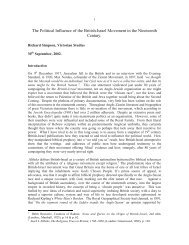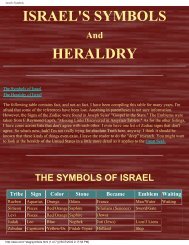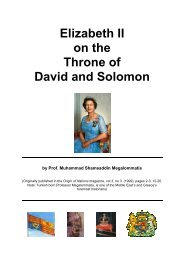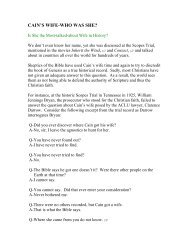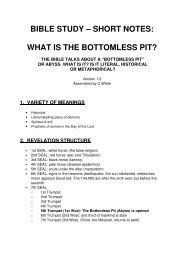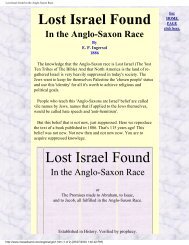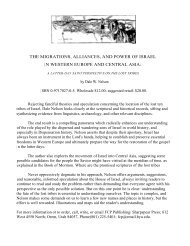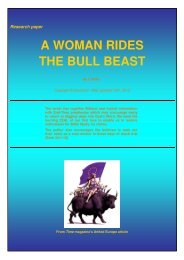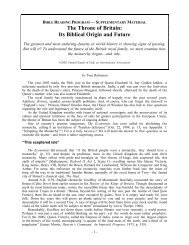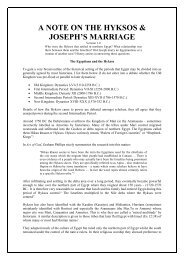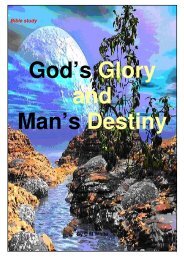CH. 6. COMMON LAW AMONG THE ANCIENT ... - Origin of Nations
CH. 6. COMMON LAW AMONG THE ANCIENT ... - Origin of Nations
CH. 6. COMMON LAW AMONG THE ANCIENT ... - Origin of Nations
You also want an ePaper? Increase the reach of your titles
YUMPU automatically turns print PDFs into web optimized ePapers that Google loves.
Basil Jones, Bishop <strong>of</strong> St. Davids, by his valuable book Vestiges <strong>of</strong> the Gael in Gwynnedd(alias North Wales), has contributed largely to the knowledge <strong>of</strong> this subject. He came tothe conclusion that the Irish occupied the whole <strong>of</strong> Anglesey, Carnarvon, Merioneth, andCardiganshire -- in addition to at least portions also <strong>of</strong> Denbighshire, Montgomeryshire,and Radnorshire. The same tribes who occupied Anglesey and Gwynedd, also occupiedthe Isle <strong>of</strong> Man.The first occupation <strong>of</strong> Man, Anglesey and Gwynedd took place before the dominance <strong>of</strong>the Scots. The position <strong>of</strong> the Goidelic population in Galloway (within SouthwesternScotland) is, however, so peculiar -- that one has no hesitation in saying it is derived froman emigration <strong>of</strong> Irish Cruithni or Picts, consequent on the Scotic invasion <strong>of</strong> Ulster.Bede is the earliest authority for such a migration.#50#The contact between Ireland and Britain at that time implies also reverse direction traffic-- from Britain to Ireland. Nowhere is this seen more clearly -- than in the evangelization<strong>of</strong> Ireland from Britain.Rolleston points out#51# that Ollamh was the Lycurgus or Solon <strong>of</strong> Ireland, giving to thecountry a code <strong>of</strong> legislation -- under the ard-ri or 'high king' at Tara -- among thevarious provincial chiefs. This was a "one-and-many" confederacy, still reflecting theprimordial revelation <strong>of</strong> God's Tri-unity. Cf. First Corinthians 12:3-20. The greattriennial fair or festival took place at Tara, where the sub-kings and historians andmusicians from all parts <strong>of</strong> Ireland assembled to enact laws, hear disputed cases, andsettle succession.Ollamh ordained that historical records be examined in triennial assembly, and thatcopies be inserted in the so-called Psalter <strong>of</strong> Tara. The latter has been lost, but part#52#<strong>of</strong> it has been preserved in the later though still ancient Psalter <strong>of</strong> Cashel. That greatantiquary -- the Westminster Assembly's Puritan Archbishop James Ussher <strong>of</strong> Ireland --speaks also <strong>of</strong> the Annals <strong>of</strong> Tigernach.#53#The 1951 Encyclopedia Americana states#54# that clear pro<strong>of</strong> <strong>of</strong> existence <strong>of</strong> an ancientcivilization, marvellous for its time, was the institution <strong>of</strong> Feis Teomran (alias the'Triennial Parliament') <strong>of</strong> Tara. The monarch, Ollamh Fodhla -- who reigned as ard-ri orhigh-king <strong>of</strong> Erin about 1383 years before Christ -- established this Parliament.Possibly following the model given in Numbers 10:2-4 (through international contactwith the Israelites in the Near East), Ollamh Fodhla was in fact the Irish originator <strong>of</strong> thefirst bicameral constitutional Parliament in Europe. This was later exported from Irelandto Pre-Christian Britain.In Ireland, continues the Encyclopedia Americana, the various subordinate royalchieftains constituted one branch; the ollavs or scholars and bards, law-givers, judges andhistorians, another branch; and the third consisted <strong>of</strong> the military commanders. Underthe ard-ri or high-king, were the kings <strong>of</strong> the Provinces (or governors <strong>of</strong> the States); andunder each king were the clans. They were governed locally by a chief, each clanselecting its own.12



